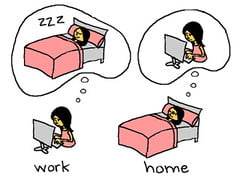Sleep and stress are intimately related. Stress may impair the quality of our sleep, which in turn can make us feel more stressed. It might be challenging to escape the vicious cycle. This article will examine the relationship between stress and sleep and offer advice on how to control stress to get better sleep. You may enhance your sleep and lessen stress in your life by being aware of the link between sleep and stress and using relaxing techniques.
Table of Contents
The Relationship Between Stress and Sleep
Stress and sleep are tightly related. Stress can impair the quality of our sleep, making it difficult to fall asleep or stay asleep all night. A lack of sleep might make us feel even more agitated the following day. Although it might be challenging to interrupt this pattern, we can enhance our sleep and control our stress by knowing how they are related.
The impact of stress on sleep
Your ability to sleep can be impacted by stress in many different ways. The following are some of the typical ways stress affects your ability to sleep:
Inability to relax and go to sleep
When you’re anxious, your thoughts may run, making it difficult to do so.
Waking up during the night
Stress might cause you to wake up in the middle of the night and have trouble settling back to sleep.
Insomnia
Insomnia is a sleep condition that makes it difficult to fall asleep or remain asleep. Persistent stress can cause insomnia.
Nightmares
Stress can result in vivid, distressing nightmares that may lead you to wake up in the middle of the night.

Tips for Managing Stress to Improve Sleep
Maintain a regular sleep schedule
Even on weekends, try to go to bed and wake up at the same times every day.
Consistent sleep is vital to your health. Even on weekends, bedtime and waketime should be the same. This regulates your internal clock, improving sleep quality and making it simpler to go to sleep and wake up.
Your body gets used to the same bedtime and wakeup time, making it simpler to fall asleep and wake up. This can prevent insomnia and other sleep problems that interrupt sleep patterns and cause daytime weariness.
Consistent sleep schedules also improve mental and physical wellness. Studies reveal that regular sleepers are less likely to develop mood problems, including despair and anxiety, a healthy body weight, and chronic diseases.
In conclusion, it’s better to stick to a sleep pattern and put your health first. By following a schedule, you can improve your sleep, health, vitality, and productivity.
Exercise
Regular exercise can help lower stress levels and enhance the quality of sleep.
Exercise provides many physical and emotional benefits. Regular exercise reduces stress. Exercise releases endorphins, which help reduce stress and anxiety. Exercise also lowers the stress hormone cortisol. Cortisol reduction reduces stress and improves mood.
Exercise reduces stress and improves sleep. Studies demonstrate that regular exercisers fall asleep faster and stay asleep longer than non-exercisers. Exercise also improves sleep quality, making nights more peaceful.
Exercise improves mental and physical wellness. Exercise improves health and well-being by lowering stress and improving sleep.
Avoid caffeine and alcohol
Coffee and alcohol should be avoided before night since they can interfere with your sleep.
Coffee and alcohol before bed might disrupt sleep. Coffee, a stimulant, makes it hard to fall and remain asleep. Even if coffee helps you fall asleep, you may wake up frequently and not get the restorative sleep your body requires.
However, alcohol disrupts the natural sleep cycle, causing fragmented and poor-quality sleep. It can keep you up at night and make you tired in the morning.
Dehydration from coffee and alcohol might worsen sleep issues and other health issues.
Avoid coffee and alcohol before bedtime to sleep well. Instead, drink herbal tea or warm milk and relax with reading or music. Good sleep habits boost health.
Create a relaxing bedtime routine
Establish a tranquil nighttime ritual that includes taking a warm bath, reading a book, or listening to relaxing music.
A relaxing nighttime routine will help you fall asleep. A warm bath before bedtime works well. A warm bath relaxes muscles and lowers body temperature, which is vital for proper sleep. Lavender essential oil can calm your bathwater.
Reading before bedtime relaxes you too. Reading can help you relax and unleash your imagination. It calms and relaxes. Choose an engaging but not overstimulating book to stay awake longer.
Listen to soothing music before bed instead of reading. Calming music can alleviate tension. Create a mix of relaxing music or download a guided meditation or relaxation app.
These hobbies can help you relax before bed and stay asleep. Relaxing before bed can help you sleep better and wake up refreshed.
Practice relaxation techniques
Use relaxation strategies to improve your sleep and reduce stress. They include deep breathing, meditation, and yoga.
Methods of Relaxing for Better Sleep
You might attempt the following relaxing methods to get better quality sleep:
Deep breathing
Pay attention to your breath as you slowly inhale with your nose and exhale through your mouth.
Take some time to focus on your breath as you start to pay attention to it. Feel the air moving through your nostrils and mouth as you inhale and exhale.
Slow, deep breaths supply your lungs with oxygen. Release tension and stress as you breathe. Slow, steady breathing relaxes you.
While focusing on your breath, your thoughts may stray. The norm. Acknowledge the thought or distraction and slowly return to your breath. This exercise can help you become more focused and grounded in your daily life.
Meditation
Choose a calm area, sit down to meditate, and pay attention to your breathing to cleanse your mind of any distracting ideas.
Meditation can help you find calm in the midst of daily chaos. Meditation requires a peaceful place to sit and focus. This could be a peaceful area of your office, a home meditation room, or a park or forest.
After finding your perfect meditation area, sit down and clear your mind. Focusing on your breath is an excellent method. Close your eyes and focus on the airflow. Feel your chest rise and fall, and your lungs expand and collapse.
Your thoughts may wander while you focus on your breath. You might think of your to-do list, work issues, or a chat from earlier in the day. Acknowledge the notion and gradually return to your breath.
With practice, you can calm your thoughts and focus on your breath for longer. This can improve your mental and emotional health, helping you stay calm and focused throughout the day. Meditation is a simple but powerful way to clear your mind.
Progressive muscle relaxation
Starting at your toes and working your way up to your head, tense and relax each muscle group in your body.
Progressive muscle relaxation reduces stress by tensing and relaxing distinct muscular groups.
Start by finding a peaceful spot. Start by inhaling and exhaling slowly. Focus on curling and relaxing your toes. Tensing your feet by pointing them away from you, relax them.
Continue contracting and relaxing your calf muscles, thighs, buttocks, belly, chest, back, arms, hands, neck, and finally your face. Breathe deeply and exhale to relax each muscle group. Observe the difference between strained and relaxed muscles.
The exercise should calm you. This stress-reduction approach can be done anytime.
Yoga
Yoga is a relaxing exercise that can help with stress management.
Yoga is an ancient Indian physical, mental, and spiritual discipline. It promotes strength, flexibility, and relaxation through postures, breathing, and meditation. Yoga reduces anxiety, depression, and overall stress.
Regular yoga practice promotes calm and reduces stress. Improved circulation reduces inflammation and blood pressure. Yoga also improves sleep, which reduces stress and improves health.
Yoga enhances mindfulness and alertness. Focusing on the breath and the current moment can increase self-awareness and mental clarity. This reduces negative self-talk and promotes relaxation.
Yoga reduces stress and improves health. Yoga can calm, focus, and balance you whether you’re a novice or an expert.
FAQs About Sleep and Stress
Q. What amount of sleep do I require?
A: Adults typically require 7-9 hours of sleep each night.
Q. Can stress contribute to sleep apnea?

A: Certainly, stress can exacerbate sleep apnea, a condition that causes irregular breathing during the night.
Q. Does exercise help you feel less stressed?
A: Absolutely, regular exercise can help you feel less stressed and have better sleep.



